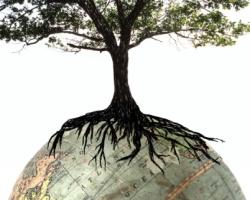I’m not sure it’s possible to be unaware of environmental issues in 2010. After all, a Nobel Peace Prize helped bring attention to the issues of human impact on climate; recycling efforts are now ubiquitous in many areas of the country; and large corporations have invested billions in “greening” their products and production.
Why, then, do the roles of government and individuals in our stewardship of the earth seem so contentious? Sure, it’s tough to weigh uncertain scientific projections with economic impacts, tougher still to create precautionary environmental standards, particularly in a global economic crisis. The widely publicized errors in the report from the Intergovernmental Panel on Climate Change don’t help; neither does the news of e-mail exchanges between top scientists working on climate research. Each has added fresh energy to debates about the environment from the halls of Congress to Facebook posts.
This April as we mark the 40th anniversary of Earth Day, we’d do well to remember it as a day that since its inception was successful because of its remarkable grassroots response. Ever since, we’ve all become aware of the daily choices we encounter where there really should be no debate, situations where we could all do our part.
My young sons for instance, have incredible enthusiasm for recycling, probably because they imagine the recycling truck magically rejuvenating their exhausted juice can for them. When I realized they didn’t quite understand the process, my initial leaning was to correct it; but then I wondered what might happen if we all adopted a similar zeal.
Perhaps their understanding is closer to the big picture on which we need to focus. How can we tackle the major issues facing our world if we do not enthusiastically surmount the ordinary?
Aluminum, for instance, is the most abundant metal on earth. Its abundance, though, was not always recognized, hence the crowning point of the Washington Monument being made of such a “rare and precious metal.” It’s not a pure element in nature; it’s combined with others such as oxygen. Removing these other elements to produce pure aluminum is one of the most energetically costly processes taking place daily on our planet. So recycling aluminum not only prevents unnecessary volume in landfills but provides an estimated 95 percent energy savings over new production.
Although water covers the majority of our planet, only about 3percent of the world’s water is fresh with only a third of that in liquid form. Yet we can’t live without it. Some estimate that within the next 15 years, 1.8 billion people will live in regions where water is scarce.
As New Englanders pump the spring rains from our basements, it may be hard to appreciate the value of this resource. Nevertheless, perhaps the best explanation for relatively limited media focus on global water issues is that there simply is no viable alternative. We cannot substitute another chemical for H2O.
So although heavy rains or shortages create challenges, maintaining water purity is crucial. Many pollutants are dangerous even in minute quantities–parts-per-million and lower levels. The destructive environmental and human health impact of water pollution from such sources as improper recycling of electronics in developing nations requires our attention and action. We can’t afford to under-appreciate this vital resource.
Which might be why the American Chemical Society, the world’s largest scientific society, held its conference last month with the theme “Chemistry for a Sustainable World.” Thankfully, the focus was due to strong interest in the scientific community and particularly in the younger generation of scientists. Along with colleagues and students, I attended the ACS meeting to participate in presentations, collaborate with other scientists and help with green chemistry workshops. I was encouraged by what I saw. Each interaction reinforced what we’ve already been teaching and observing: that the next generation of scientists and stewards—today’s students—are quick to embrace a ‘green’ vision.
That’s good news for the Earth and for those who see caring for it as an extension of their faith. Though some might want to separate the spiritual from the material, the mandate from our Creator is clear: He saw what he’d made and it was very good.
Apart from all the debates, one thing on which we all can agree, especially as we enjoy the beauty of nature’s rebirth with spring’s arrival, is that the resources of our world matter. This Earth Day only can be happy if we continue to value and invest in that which we’ve been given.




